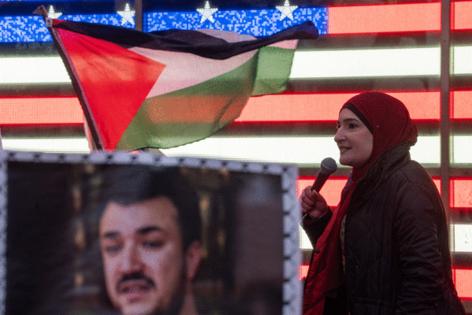Trump targeting of Mahmoud Khalil is baseless and has caused extreme psychological harm, lawyers say
Published in News & Features
NEW YORK — Attorneys for detained Columbia graduate student Mahmoud Khalil in new filings say the Trump administration has damaged his reputation and severely undermined his ability to pursue a career in international diplomacy and human rights “by baselessly identifying him as a risk to the foreign policy of the United States” based on his advocacy for Palestinians and criticism of Israel, “marking him and his family as targets for harassment and notoriety.”
“(The) longer the determination stands, the more reputational damage it does,” Khalil’s legal team wrote.
The New Jersey federal court filing came in support of Khalil’s motion for a preliminary injunction in his habeas corpus case, which seeks his immediate release from custody.
Lawyers are also calling for the vacating of Secretary of State Marco Rubio’s determination as to why he should be deported, and — more broadly — an injunction stopping the federal government from enforcing a policy of arresting, detaining, and removing noncitizens who engage in speech supporting Palestinian rights or criticizing Israel.
The Trump administration has not alleged Khalil broke any laws. It has sought to revoke his green card and deport him based on a rarely-used provision of the 1952 Immigration and Nationality Act, which empowers Rubio to expel someone from the country if their activities and beliefs are considered adverse to U.S. foreign policy interests, which in Khalil’s case, pertains to U.S. support for Israel.
Khalil’s case in New Jersey challenging the legality of his detention is playing out separately from his immigration case in Louisiana.
In April, the immigration judge ordered his deportation in finding the government had met its burden, a decision he intends to appeal. The federal New Jersey judge, Michael Farbiarz, has said he cannot be deported while his habeas corpus matter plays out.
Agents from the Department of Homeland Security took Khalil into custody on March 8 as he arrived home to his Columbia-owned apartment with his wife, Dr. Noor Abdalla, from an iftar dinner. He was brought to lower Manhattan’s 26 Federal Plaza for processing, driven to a facility in Elizabeth, New Jersey, overnight, and transported more than 1,000 miles away to Jena, Louisiana, the next morning, a Sunday, where he has since remained incarcerated at a detention center.
In a ruling last week, Farbiarz, who is yet to rule on the legality of Khalil’s detention, said the government’s reasoning for seeking to deport him is likely unconstitutional.
“Our law asks about an ‘ordinary person.’ Would he know that [the rarely-used provision] could be used against him based on his speech inside the United States, however odious it might allegedly have been — speech that has not been affirmatively determined by the Secretary to have an impact on U.S. relations with other countries? The Court’s answer is no,” Farbiarz wrote.
In Khalil’s parallel immigration case, the judge, Jamee Comans, last month heard testimony from the student activist and several experts who said his deportation could result in his kidnapping, torture, or even death due to his prominent criticism of Israel.
Comans denied a renewed motion to end the deportation proceedings based on agents’ failure to provide a warrant upon his arrest, The New York Times reported, and reserved issuing a decision on his bid for asylum.
In the filings made public Thursday, Khalil’s lawyers asked for permission to file under seal an expert declaration outlining the extreme psychological harm he’s endured from the “shock of unjust arrest and continued detention and family separation,” which they say “will inevitably severely worsen absent release.” A judge gave government lawyers until Friday to object to filing the assessment under seal.
“These harms include the loss of Mr. Khalil’s liberty; the chilling of his First Amendment protected activities; the separation from his family, particularly his wife and newborn child; and psychological harm specific to his arrest and detention,” Khalil’s lawyers wrote.
A Palestinian who was raised in a refugee camp in Syria, Khalil came to the U.S. in December 2022 on a student visa, married Abdalla, who’s from the Midwest, in November 2023, and became a lawful permanent resident in 2024.
He completed his Master’s degree at Columbia’s School of International and Public Affairs in December and would have graduated last month. Abdalla accepted his diploma on his behalf a month after giving birth to their first child, a baby boy.
With experience working for a British embassy and interning with the United Nations in New York, Khalil was selected to play the role of a mediator and negotiator between the university’s administration and students during campus protests last year against Israel’s war on Gaza and Columbia’s ties to the Israeli regime.
Donald Trump and his Cabinet members have repeatedly characterized Khalil’s advocacy and criticism of Israel in general as antisemitic and inherently supportive of Hamas. The Trump administration has since targeted hundreds of international students for their advocacy for Gazans and criticism of Israeli military activity.
Khalil has denounced antisemitism, and in his public-facing role speaking to media on behalf of protesters before his arrest, he repeatedly maintained that the movement should advocate for justice and equality for all groups, telling CNN in April 2024, “As a Palestinian student, I believe that the liberation of the Palestinian people and the Jewish people are intertwined and go hand-by-hand and you cannot achieve one without the other.”
_____
©2025 New York Daily News. Visit at nydailynews.com. Distributed by Tribune Content Agency, LLC.







Comments